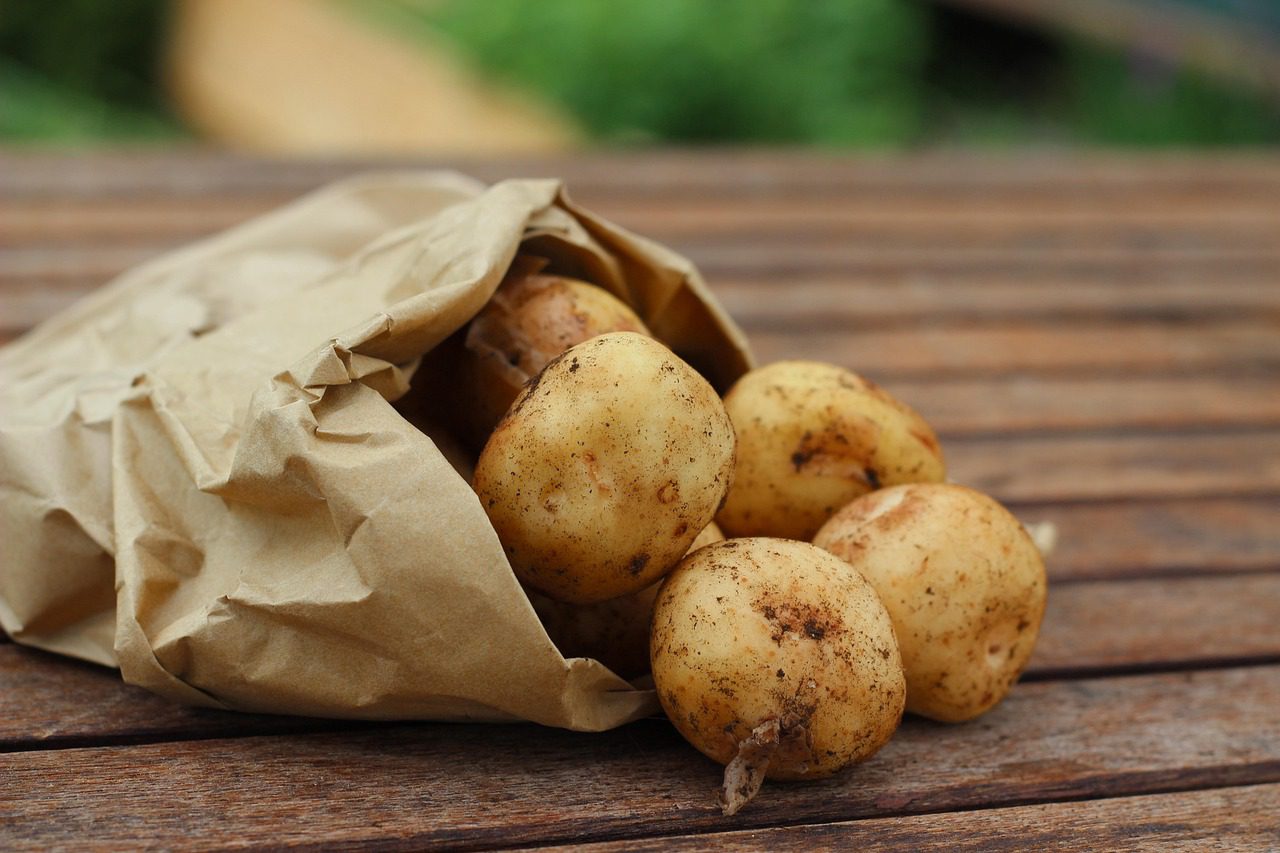Our Guide With Tips for Home Composters
Can I put sprouting potatoes in compost? Discover the simple do’s and don’ts for adding sprouting spuds to your compost heap with confidence.
Key Takeaways:
- Yes, you can put sprouting potatoes in compost if you follow a few simple steps.
- Chopping or cooking potatoes before composting helps prevent new plants from growing in your pile.
- Hot composting or using a compost tumbler reduces the risk of spreading pests or disease.
- Sprouting potatoes fit well in most home composting systems, including vermicomposting, with some basic precautions.
- Always avoid diseased potatoes and potato plants, as they could cause problems for your compost.
- Composting supports a less wasteful, more sustainable lifestyle and makes great soil for your garden.
Keep reading for a friendly, confidence-boosting guide to composting sprouting potatoes, plus step-by-step advice, common risks, and a handy summary with FAQs to help you compost with ease. Welcome!
Composting is simply turning your kitchen and garden scraps into rich, plant-loving soil. It’s a simple way to keep food waste out of landfills and grow a greener, healthier garden.
You help nature recycle and boost your plants at the same time.
So, can you put sprouting potatoes in compost?
Yes, you can! With a few easy precautions, sprouting potatoes can be added to your compost pile, whether you’re using a backyard heap, a compost tumbler, or even trying vermicomposting with worms.
The trick is to stop those sprouting eyes from turning into a mini potato patch inside your compost.
Sprouting potatoes matter for home composters because they offer a chance to reuse food waste, but they need a little extra care.
Add them right and you keep pests away, reduce unwanted weeds, and make compost safely.
If you’re composting with kids or pets around, see these safe composting practices for families with pets and kids to avoid any surprises.
Key Takeaways:
- Composting turns waste into useful soil.
- You can safely compost sprouting potatoes using simple steps.
- Cut or cook potatoes first to keep your bin tidy.
- Hot methods, like using a compost tumbler, help break them down fast.
- Try vermicomposting if you want worms to lend a hand.
- Always keep sick or moldy potatoes out of the mix.
Ready to learn more? Let’s explore easy ways to make the most of your compost and keep your garden growing strong.
Can You Put Sprouting Potatoes in Compost? The Straight Answer
People often wonder: can I put sprouting potatoes in compost, or do they spell trouble for my bin? The simple answer is yes, you can compost sprouting potatoes with just a bit of care.
Potatoes, whether sprouting or not, are rich in nutrients that will feed your compost and eventually your garden soil.
Still, like adding any starchy food to your pile, they come with a few quirks.
Let’s break down exactly what happens when you toss in those sprouting spuds, the potential risks, and the best ways to keep things running smoothly.
What Happens When You Compost Sprouting Potatoes?
Sprouting potatoes behave a bit like stubborn students in the back of class—they sometimes don’t follow directions.
If you add whole sprouting potatoes to your compost, the “eyes” (those tiny budding shoots) may decide it’s a perfect place to grow. In a mild, damp compost heap, potatoes can start growing mini-plants instead of breaking down right away.
That’s their survival instinct!
The decomposition process begins once microbes and worms find the chopped or broken potato pieces.
If your compost is hot, meaning it heats up past 50°C (122°F), these potatoes quickly soften and join the rest of the organic mix.
The starchy insides are water-rich and eventually break down, adding good volume to your finished compost.
But if your pile is cooler or packed full of whole potatoes, you might spot some white roots and leaf shoots in a few weeks.
This isn’t usually a disaster—once turned and chopped, those would-be plants will decompose as normal.
Chop them up before adding, and you’ll speed up the whole process and encourage an even, pest-free breakdown.
For more on how other home composters handle sprouting potatoes, you can visit the discussion at r/composting – What do I do with these potatoes growing ….

Risks and How to Minimize Them
Adding sprouting potatoes isn’t without a little risk, but nothing you can’t handle.
Common risks include:
- Potato plants sprouting in your pile: Sometimes, potatoes don’t rot right away. Instead, they try to grow. This uses up space and slows composting.
- Spreading plant disease: Potatoes can carry diseases like potato blight. If you add a sick potato, the disease could linger and infect your garden.
- Attracting pests: Rodents and insects love starchy vegetables. Whole potatoes can become a pest magnet, especially in an open or cool pile.
How to keep things safe and tidy:
- Chop or crush potatoes: Breaking potatoes into pieces gives microbes a head start and stops those eyes from sprouting.
- Bury well: Place potatoes in the center of your pile or under layers of grass and leaves, which helps heat build up and discourages pests.
- Hot compost as much as possible: If your pile or compost tumbler heats up, diseases and sprouting problems taper off. For a guide on composting year-round and keeping things safe for everyone, check out these compost safety tips for children and pets.
- Avoid diseased potatoes: Never compost obviously rotting or sick spuds. Toss those in the bin to keep your compost clean.
Find more info about safely composting potatoes and the potential for disease spread at Can You Compost Potato?.
Best Ways to Compost Potatoes Successfully
Ready to add your sprouting potatoes to the compost? Here’s how to do it without a hitch:
- Inspect first. Only use potatoes that are healthy and free from signs of disease or mold.
- Chop into small chunks. The smaller the pieces, the faster they break down, and the less chance they have to sprout.
- Bury deep. Push chopped potatoes into the center of your pile or into the middle of your compost tumbler. This is where the most heat and microbial action happens.
- Hot compost is best. If you’re using a hot pile or a compost tumbler, those spuds will cook down fast. Hot composting also helps kill off most pests and diseases.
- Cold composting works too. Just chop and bury well—you may need to turn your pile more often to disrupt any sprouts.
- Try vermicomposting. Worm bins can handle a few bits of potato at a time. Don’t overload, as potatoes take longer to break down and can get slimy if added in bulk. Worms prefer pieces spread out rather than a huge clump.
 Photo by Sippakorn Yamkasikorn
Photo by Sippakorn Yamkasikorn
If you want a beginner-friendly rundown of starting up your first compost pile, have a look at these helpful tips for starting composting at home.
Sprouting potatoes can fit right into almost any home composting method, including vermicomposting systems and turning bins.
Just remember that a little prep keeps your pile healthy and free of unwanted plants or pests.
If you’re interested in various composting methods and how potatoes might fit into each, explore these 6 effective composting methods.
Key Takeaways:
- Sprouting potatoes can go in the compost if you chop and bury them.
- Hot composting and compost tumblers help break down potatoes quickly.
- Always exclude diseased potatoes to avoid spreading plant problems.
- Vermicomposting worms handle small chunks, not whole spuds.
- A bit of prep can prevent pest issues and potato plants taking root in your bin.
Composting Basics: Making the Most of Organic Scraps
Composting is a rewarding way to recycle kitchen scraps, trim down rubbish, and make homemade plant food for your garden.
But when it comes to things like sprouting potatoes, some folks get cautious. Can I put sprouting potatoes in compost without turning my bin into a potato patch?
The answer is yes, as long as you follow a few basic rules.
Let’s break down how different composting setups handle potato scraps and which items to skip to keep your compost healthy.
Common Composting Methods – and Where Potatoes Fit In
There are several popular approaches to composting at home. Some suit potato scraps better than others—let’s compare the main methods:
- Traditional Compost Pile:
This classic backyard heap is great for most kitchen waste, including sprouting potatoes. - Chop potatoes up first, bury them in the middle, and mix them with dry materials like leaves or shredded paper.
- The key is heat and regular turning, which stops the potatoes from sprouting and helps them break down fast.
- Compost Tumbler:
Compost tumblers are sealed, barrel-like bins you spin to mix the contents. These work well for potato waste because they heat up quickly and keep pests out. - Toss in chopped or even cooked sprouting potatoes, give the barrel a spin every few days, and let the high temps do the hard work.
- Many composters find that a tumbler reduces the chances of surprise potato plants. Want more tips? Check out this step-by-step guide on starting composting at home.
- Vermicomposting (Worm Bins):
Worm bins use red wigglers or similar composting worms to munch through organic scraps. Potatoes are okay for vermicomposting when added in moderation and well-chopped. - Avoid adding whole sprouting potatoes, as they take longer to break down and can attract gnats.
- Mixing potato bits with other green and brown materials helps balance moisture and keeps worms happy. Bananas are excellent in this when adding potatoes.
 Photo by Monstera Production
Photo by Monstera Production
Where do sprouting potatoes fit in?
They’re a solid fit for all three composting setups as long as you cut them into pieces and bury them well.
Hot piles and tumblers work best for reducing the risk of sprouting and pests.
For more tips on choosing a method, explore this handy resource on six effective composting methods.
If you want more real-life advice, see this Reddit composting thread about potatoes.
What Not to Add to Your Compost Bin
Making good compost is about balance. While sprouting potatoes can go in with a little care, some materials cause more trouble than they’re worth.
Here’s a quick list of what to avoid, especially if you’re new to composting:
- Diseased plants:
Skip any potato (or plant) that looks moldy, blighted, or sick. Disease can survive in compost and spread back to your garden. - Meat and dairy:
These attract pests, create bad smells, and don’t break down well in home compost bins. - Large bones, oils, and fats:
They’re slow to break down and make your bin attractive to animals. - Glossy or coated paper:
Shiny magazines or plastic-coated paper won’t compost properly. - Pet waste from dogs or cats:
These often carry pathogens and are best left out.
While these are no-gos, feel free to experiment with most fruit and veggie scraps (including those sprouts with a bit of prep).
The goal is to keep your compost safe and simple—especially when you’re starting out.
For a comprehensive beginner’s guide (and plenty more do’s and don’ts), check out the tips on how to start composting at home.
Key takeaways for this section:
- You can compost sprouting potatoes using traditional piles, tumblers, or worm bins if you prep them right.
- Avoid composting diseased spuds and other risky materials to keep your bin healthy.
- Hot composting and tumblers help break down starchy scraps faster and reduce unwanted sprouting.
Tips for Sustainable Composting with Potatoes and Beyond
Chucking kitchen scraps into the compost pile feels good, but making sure they break down safely takes a little know-how—especially with sprouting potatoes.
These lumpy, green-eyed spuds have a stubborn streak, but they’re far from compost bin troublemakers if you handle them right.
Whether you’re using a classic heap, a modern compost tumbler, or even venturing into vermicomposting, a few simple tips can boost your results and help keep your system running smoothly.
This section shares practical, eco-friendly ideas for composting potatoes and other food scraps without unwanted surprises.
 Photo by Tamara Elnova
Photo by Tamara Elnova
Key Takeaways: Sprouting Potatoes and Your Compost
For those asking “can I put sprouting potatoes in compost?”, here’s a cheerful cheat sheet to help you compost confidently—potatoes and all:
- Yes, you can compost sprouting potatoes. Chop them up or cook first to keep new shoots at bay and make them easier for microbes and worms to process.
- Use all your tools: Compost tumblers and hot piles break down potato scraps quickly and stop them from becoming accidental potato plants.
- Toss in other veggie scraps, too: Carrot tops, apple cores, and banana peels all boost the finished compost’s nutrients.
- Small amounts work best: Potatoes are starchy and can get slimy if added in bulk, so mix them with leaves, paper, or grass clippings for balance.
- No sick potatoes: If a potato is moldy, rotten, or has signs of disease, leave it out of your compost to protect your soil and plants.
- Try vermicomposting for variety: Worm bins handle small bits of potato, but don’t overload them—happy worms work best on a mixed menu.
- You’re building healthy soil: Composting potatoes (and other scraps) turns kitchen waste into plant food, reduces landfill waste, and encourages a greener backyard.
- Keep learning for better results: Strong compost piles turn kitchen waste into healthy soil faster and with fewer pests. Check out easy composting methods at home for step-by-step tips, or read about six simple composting techniques to find the best style for your needs.
Composting isn’t just for potato peels—most veggie scraps can take a turn in the bin.
If you’re curious about what else to add or need compost help on the fly, use Compost Charm’s Ask A Question tool for instant, friendly advice.
Remember, adding sprouting potatoes to your compost helps answer the big sustainable living question: how can we waste less and grow more?
For a deeper dive into why potato scraps sometimes sprout in the pile, visit Potato Compost Hilling: Will Potatoes Grow In Compost.
If you want to avoid common potato composting mistakes, this composting potatoes guide is another solid resource.
By composting smartly, you create a closed-loop system where every potato (sprouting or not) helps keep your garden and the planet a little greener.
Summary and FAQs for Confident Composters
Wrapping up the big question—can I put sprouting potatoes in compost? Absolutely, with a little know-how and a dash of composting confidence.
Whether you’re adding potato scraps to a traditional pile, investing in a compost tumbler, or even trying vermicomposting, a few easy steps help you manage these veggies while keeping your compost healthy and guilt-free.
Let’s recap what to remember before you toss those spuds and answer some common questions every home composter asks.
Quick Summary and Key Takeaways
Composting is all about recycling food waste into something magical for your garden.
Potato peelings and sprouting spuds can join the mix with minimal fuss, provided you follow these points:
- Chop first: Cutting up sprouting potatoes keeps them from taking root in your compost bin.
- Compost with care: Keep diseased or moldy potatoes out to protect your compost and future plants.
- Hot compost wins: Bringing the heat with a compost tumbler or hot pile speeds up breakdown and limits sprouting.
- Balance is best: Mix potato bits with dry “brown” materials like shredded leaves or paper for a healthy, odor-free compost.
- Vermicomposting-friendly: Worm bins can handle small amounts of potato, but don’t overload—worms like variety!
- Check your progress: If you spot potato shoots in your pile, just turn or bury them deeper.
Most importantly, making soft, sprouted potatoes part of your compost routine helps reduce household waste and creates rich soil. You’re helping your garden and the planet in one go.
Looking for more tips on what to toss and what to keep out? Visit this helpful guide on starting composting at home.
Frequently Asked Questions
Here are answers to the questions new and seasoned composters often wonder about, especially when handling sprouting potatoes.
Can I put sprouting potatoes in compost with other veggie scraps?
Yes! Chop them up and mix with carrot tops, apple cores, and coffee grounds. The blend helps everything break down smoother and keeps your compost healthy.
What if potatoes grow in my compost pile?
It happens. Sprouted eyes may start new potato plants if your pile is cool. Just turn your compost regularly or chop up the shoots.
For more on whether you can eat volunteer potatoes or transplant them, check out this discussion on eating potatoes from compost bins.
Are there risks with composting potatoes?
The main risk is potatoes spreading disease, like blight, if they’re already infected. Always leave diseased plant parts out. If you catch shoots forming, simply bury or turn them under.
Will potatoes break down in a compost tumbler?
Definitely. The warmth and turning action of a compost tumbler will break down potatoes faster. Tumblers also help prevent pests and unwanted plant growth.
Can I use compost with potatoes on food crops?
As long as you avoided diseased potatoes, finished compost is safe for all garden beds, including food crops. Healthy compost adds nutrients and helps plants thrive.
What about using potatoes in vermicomposting?
Worms enjoy a bit of potato, but not too much at once. Add small pieces, space them out in the bin, and mix with paper or veggie scraps for balance.
How do I handle moldy or sick potatoes?
Always toss them in your household bin, not your compost. Mold and disease can linger even after composting and harm your soil.
For more practical tips on keeping your pile safe all year round—with pets, children, and all sorts of kitchen scraps—peek at these seasonal composting tips.
Where can I get instant answers for specific composting questions?
If you need help on the spot, try Compost Charm’s Ask A Question tool. You’ll get quick advice, whether it’s about potatoes or anything else in your compost bin.
For another quick look at best practices, see the EPA’s simple guide to Composting at Home.
 Photo by SHVETS production
Photo by SHVETS production
Embracing composting—spuds and all—is easy when you have answers at your fingertips and a bit of cheerful support.
Keep your bin turning, experiment as you go, and join the growing number of gardeners turning kitchen waste into garden gold.
Conclusion
Yes, you can put sprouting potatoes in compost.
With a few simple steps like chopping, using a compost tumbler, or trying vermicomposting, those spuds break down and help build rich, healthy soil.
Just avoid diseased potatoes and keep a good mix of materials in your heap.
A thriving compost system is within reach for anyone—it just takes patience, the right info, and a little practice.
Composting brings gardens to life, reduces food waste, and makes every home a bit greener. If you’re curious about keeping your compost safe for the whole family, compost safety guidelines for families offer great extra tips. For more ways to level up your compost, explore using Jamieson Brothers seed compost to grow strong, happy plants.
Key takeaways:
- Chopped sprouting potatoes can go in compost bins, tumblers, and worm bins.
- Keep diseased or moldy potatoes out to protect your soil.
- Hot composting and regular turning break down potato scraps fast.
- Composting at home works for everyone, no fancy tools needed.
- Extra tips and support are just a guide away.
Everyone can compost at home with some know-how and a bit of patience. Start with what you have, experiment, and see your kitchen waste become garden gold.
For more practical tips and guides, browse the other resources on Compost Charm—your composting journey is just getting started.






